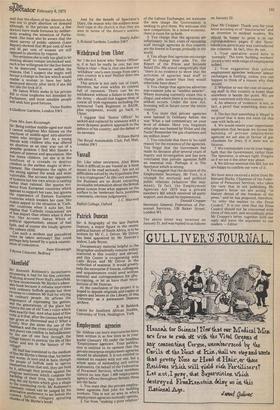e Akenfield' Sir: Kenneth Robinson's inconclusive s trumming is bad for his
film criticism. Waltzing around Peter Hall's Ahenfierd, he first recommends Mr Blythe's admirable book because it collates interviews With ordinary Suffolk people but then reverses to condemn Mr Hall for relying 9n ordinary people. He affirms the importance of expressing the genius, and the generations, of the place but rejects the use of old Tom's voice which does exactly that. And what kind of film critic is it that, after the cinema has long ago given us Marienbad and 0 What a Lovely War (let alone the use of the flashback and the cross-cutting of time and place) can confess to befuddlement by the use of one face through the Village history to portray the life of like
father and son in the history of the Village?
Mr Hall has translated to the medium of film Mr Blythe's theme that, for better and worse, in love and in hate, though the people of Suffolk seek to uproot themselves from that soil, they are held by.lt, although they protest against the religiose sanctions which condone the hardship of their lives, they fervently sing the old hymns which give a shaPe to the continuing cycle. Mr Robinson's cinematic values can be judged by his :Iternative preference to set before the amera Suffolk villagers spouting chunks of Mr Blythe's book!
And for the benefit of Spectator's Diary, the reason why the soldiers wear their caps in the church is that they are seen in terms of the dream's associa tions.
Henry Adler
3, Roland Gardens, London SW7


































 Previous page
Previous page